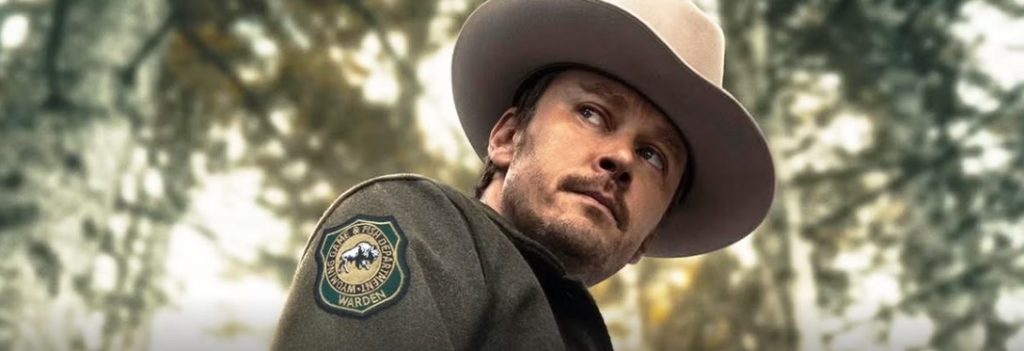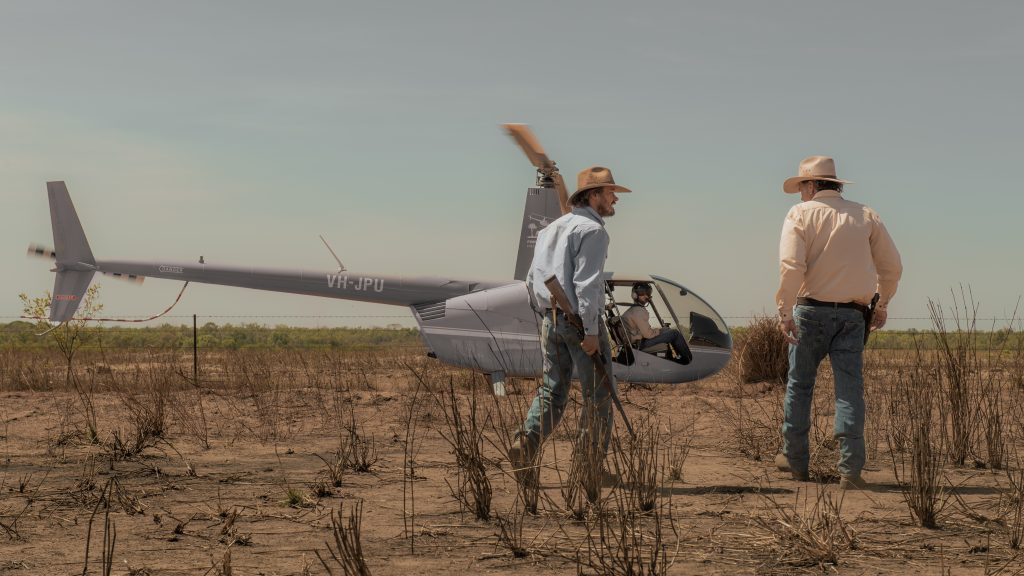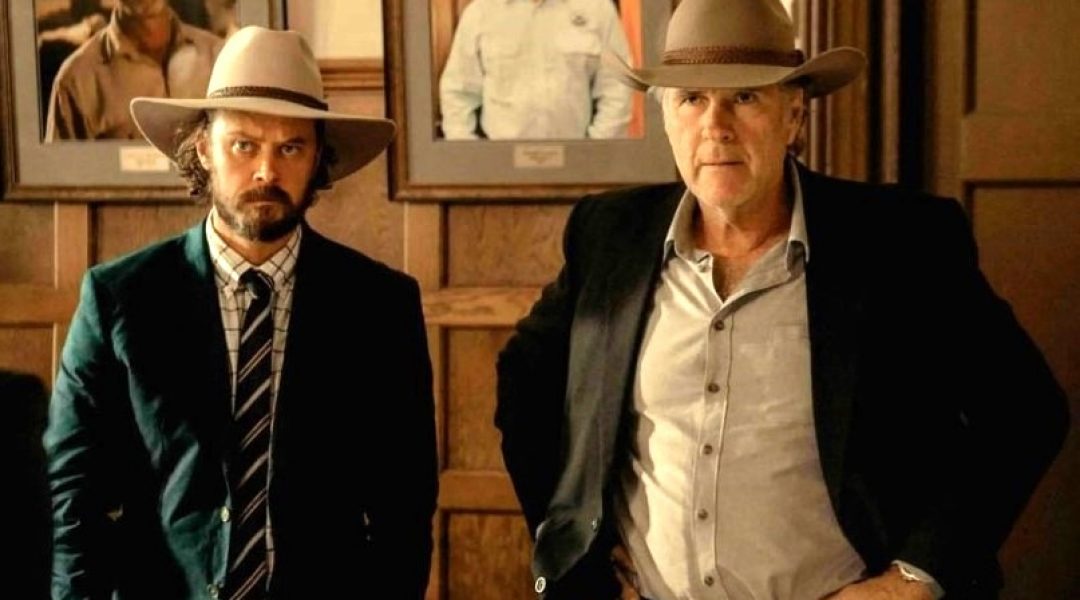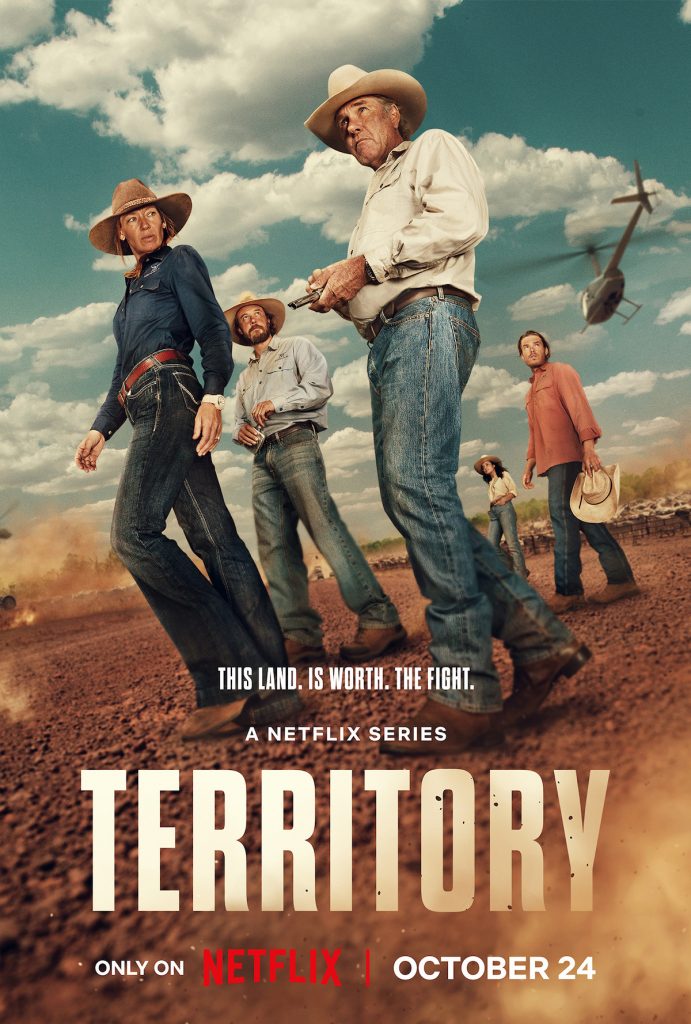C&I chats with the Joe Pickett star joining Robert Taylor for the neo-Western drama premiering October 24.
Michael Dorman is calling from Australia, where he’s just wrapped the first season of Territory, the new neo-Western drama premiering October 24 on Netflix. At least, we both hope it’s just the first season. We’re still smarting from the sting of having Joe Pickett cancelled after only a two-season run.
That show, based on the crime novels of C.J. Box, had the New Zealand-born actor well cast in the title role as a crime-solving Wyoming game warden who often encounters human predators in and around his small town. Pickett comes across as emotionally bruised but aggressively proficient, often self-doubtful yet generally reliable.
Graham Lawson, the character Dorham plays to Emmy-worthy perfection in Territory, is something else again.
Specifically, he’s a hopeless alcoholic who repeatedly disappoints his father, Colin Lawson (Robert Taylor of Longmire), owner of an Australian cattle station described as “the size of Belgium.” After the mysterious death of his eldest offspring, Colin is understandably reluctant to choose someone as ineffectual as Graham to be his heir.
And if that wasn’t humiliating enough for Graham, consider this: Emily (Anna Torv of The Last of Us), his sympathetic but not-entirely-trustworthy wife, is spending way too much quality time with an old flame who’s eager to rekindle their relationship.
No wonder the poor guy maintains such a tenuous grip on sobriety.

Here are some highlights from my recent chat with Michael Dorham.
Cowboys & Indians: When we interviewed Robert Taylor a while ago, he indicated that when the two of you were out on location, you got rather, ahem, rowdy.
Robert Dorman: [Laughs] We were very close in terms of digs and accommodation. Actually, I met Robert on my first ever show that I did in Australia. It was called The Secret Lives of Us. But I hadn’t really spent a lot of time with him since then. I’m so grateful that this project came along and our worlds collided again. We were forced to live beside each other because we’d sit there at night and we would discuss all the day’s events. It was very hot out there. There always had to be a — well, I call it a chilly bin. He calls it an esky. You probably call it a cooler.
C&I: That’s right.
Dorman: Or an ice box or something. But it had to be filled with ice. I call him Bobby. And Bobby would always make sure that there’s the ice ready, we had got the ice, as the day’s going on, because we had to stay hydrated out there. The refreshments were cool, and we saved the coolest can for the end of the day.
So we really did have a great time. But when you work with him as a scene partner on screen, he is so gripping. There were scenes that we did together — and I’ve spoken to people about this — when the crew goes silent and they’re just capturing everything that’s happening, because they see something cool is happening.
And there was many a scene where Bobby was doing something, getting incensed, or he’s the iron-fist father and he’s coming down on you. The crew would go quiet and just take in what he was doing. But then off set, he’s a very fatherly character, — the warmest, sweetest human. He’s one of those guys, anytime night or day, the phone rings or there’s knock at the door — he’s welcome. He’s a super human. I love him.

C&I: There’s a scene in an early episode where Colin expresses his disappointment in Graham by — well, smacking his son with a belt. Repeatedly. And Graham doesn’t object because feels so guilty about screwing something important by falling off the wagon. Did you have a long conversation ahead of time about how far to go with this scene? Like, maybe, “Bobby, you know this is just a TV show, right?” And he’d go, “Oh, oh no, no. I won't really hit you.” Or did you just wing it?
Dorman: Actually, when the two of us are working together, we’ll just turn up. Maybe there’ll be a few quips, a couple of one-liners here and there. We’re just sort of clearing the air, having a good old large, fun time. And then when they call action, we just go to work. So we didn’t really discuss it too much. It was like, we’re there to do a job. He shows up, I show up, away we go.
And it’s same with [Anna Torv]. We’ll turn up whenever the scene is, and we’re there to do our work. And I love working like that, where you’re having fun with someone, but as soon as they say, “Okay, you're on,” then you go in and you do your piece. And when you stop, you come back and just sit and have a good old chinwag. I love that.
And even with that scene, where Bobby’s expressing his disapproval of my choices — there’s so much trust there. It depends who it is, but if it was Bobby and something happened, like he was a little bit too rough or whatever, I’m okay with it. That’s all right. We’ll sort it out, because I know there’s no malice there. I can’t say that for everyone. And I’m not talking about this project. I’m just talking about my journey as a player telling stories. There’ve been occasions when I had to say, “No, that’s not okay...”
“We’d ride motorbikes, and we’d go on helicopters, and we’d run around with the farmhands and the cowboys out there catching snakes and looking for crocodiles — doing all the things that are adventurous and make you feel alive.”
C&I: Graham often seems hopelessly self-destructive, but you really can’t help feeling sorry for the guy. Like when someone offers him a drink at the worst possible time, and he can’t resist — I swear, when I saw that on the preview screener, I barely restrained myself from yelling at the screen: “No, man! Don’t do it! You can’t get drunk now!”
Dorman: [Laughs] Yeah, Joe, but I didn’t hear you.
C&I: What was the toughest nut for you to crack while you were trying to understand, and then play, this character?
Dorman: I think it was his evaporating belief in himself. Like if you were sanding a deck and you had to strip it all back to bare timber to allow the elements to start to eat away at it. For me with Graham, it became more about what happened to level him out and make him zero again and let the elements start to eat on him.
I looked at this character of Graham and I knew he had to have something that was so tragic that it completely broke him. You just put those things into your toolkit that no one else will hear or see. But it gives you a window into why they’re behaving in such a matter, and it gives them a justification for his sipping that drink. How do you justify that? And so the seed was this tragic event that justifies the way that he is in those moments. And I just feel like whenever you play a character like that, you really need that piece that allows you to behave the way that he is.

C&I: There’s not a lot of comic relief in this series. But were there ever days when you’d be laughing together about something so that it was difficult to do certain scenes?
Dorman: Sometimes we were just in hysterics. Even in that scene that you were talking about, where he’s not too happy with his son. When we are walking into that scene, Bobby I and just started cracking up laughing, telling jokes. And as soon as the lens can see us, we'd turn into — goodness, gracious me. And then they call cut, and we’re back to just having a great grand old time. It was like two kids who’d been friends forever, met again in the middle of the Top End of Australia’s Northern Territory. A million square acres to do whatever they want. Have at it, boys.
See, I’d never been to the Top End before, so I didn’t know what to expect. When you are completely isolated, you start to become very introspective. So it was great to have someone there that you could go out and blow off steam with. We’d ride motorbikes, and we’d go on helicopters, and we’d run around with the farmhands and the cowboys out there catching snakes and looking for crocodiles — doing all the things that are adventurous and make you feel alive.
I think there’s an element of that in the show where we’ve used landscapes to try and capture that character and that style. I don’t think we would’ve been able to tell the same story if we didn’t go to the Top End first and spend some quality time in the environment, to get a scope of what the people that we’re talking about — how they behave, how they talk, how they act, how they feel. So I found that each day was great, even though the scenes were demanding at times. We were still just having such a great time.
C&I: We’ve talked to Robert Taylor a few times about how, even now, people ask him: “When is there going to be a Longmire reboot, or just a movie to sort of wrap up the loose ends?” Do you have people asking similar questions about Joe Pickett?
Dorman: I do have people asking why it’s not still running. Absolutely. I don’t think it’s got a very large audience, but the audience that it does have are avid fans. They want to see more of those storylines, that character. And because [C.J. Box] has written so many books, there’s just so much content there to dig into. But that’s the business, that’s the way our business rolls.
The good thing is, sometimes you get that moment in time where you get to go and play. And I guess that’s why you feel such gratitude for those moments, because you know it’s not forever. You know it might come, and then go. I know that it’s s a shame, but that’s the way our business works. So make the most of the day, Joe.















